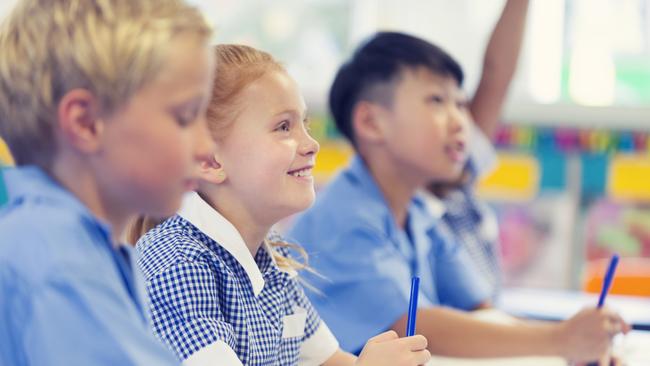Wealthy state school families receive windfall from School Savings Bonus
About 250,000 children from some of Melbourne’s wealthier state school families will receive the tax-free $400 School Savings Bonus, sparking backlash from furious private schools who missed out.
Education
Don't miss out on the headlines from Education. Followed categories will be added to My News.
Around 250,000 children from some of Melbourne’s wealthier state school families are set to receive a $100m windfall from the tax-free School Savings Bonus, the Herald Sun can reveal.
Parents from 353 state primary and 70 secondary schools with incomes above the national average will receive the one-off $400 voucher to help them pay for uniforms, camps and sport, the Herald Sun can reveal.
One third have earn more than $208,000 per year and will receive a total of $34m.
Despite this, Treasurer Tim Pallas on Wednesday said the scheme, which is not means tested, would not be changed despite a backlash from furious private schools.
A list of the state’s top 100 richest schools, as determined by the socio-economic status of parents, includes 49 state schools whose students will all get the handout.
They are mostly in Melbourne’s inner north and leafy eastern suburbs such as Camberwell, Glen Iris, Clifton Hill, Northcote, Canterbury and Balwyn, where most parents have managerial and professional jobs.
Every single state school student is eligible for the bonus next year, despite a raft of existing programs offering financial assistance for government school families to pay for camps, excursions, uniforms and even breakfasts.
The bonus will go to around 655,000 state students despite only 18 per cent qualifying for a needs-based concession card.
Meanwhile, only 27,500 Catholic and 17,000 independent students with a concession card out of a total of 360,000 private school pupils will get the state budget family sweetener.
Analysis of federal government data from 2023 shows schools with parents who earn below the national average include those from 358 private schools whose children will only get the handout if they have a concession card.

Bruce Phillips, acting CEO of the Victorian Catholic Education Authority, said the Allan Government “isn’t treating families equally”.
“Eighty-two per cent of government school families don’t have Health Care Cards but will receive payments, while 87 per cent of Catholic school families will miss out,” he said.
Melbourne Archdiocese Catholic Schools executive director Edward Simons agreed there were “hardworking Catholic school parents who are missing out”.
Dr Simons said he had spoken with 300 Catholic principals who couldn’t understand why they were excluded.
At a post-budget lunch, Mr Pallas defended the decision to not have an eligibility criteria based on need to access the payments.
“Perhaps on occasion you’ll find a few who don’t need it but it’s a better use of money to put it in the pocket of the community,” he said.
“Quite frankly, it doesn’t matter exactly how well you’re doing, everybody is doing it tough at the moment under the rigours of inflation.”
The bonus will cost the cash-strapped budget $287m, but would only cost $75m if only state school students with concession cards were eligible.



